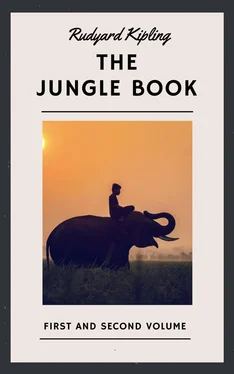“Wolf! Wolf’s cub! Go away!” shouted the priest, waving a sprig of the sacred tulsi plant.
“Again? Last time it was because I was a man. This time it is because I am a wolf. Let us go, Akela.”
A woman—it was Messua—ran across to the herd, and cried: “Oh, my son, my son! They say thou art a sorcerer who can turn himself into a beast at will. I do not believe, but go away or they will kill thee. Buldeo says thou art a wizard, but I know thou hast avenged Nathoo’s death.”
“Come back, Messua!” shouted the crowd. “Come back, or we will stone thee.”
Mowgli laughed a little short ugly laugh, for a stone had hit him in the mouth. “Run back, Messua. This is one of the foolish tales they tell under the big tree at dusk. I have at least paid for thy son’s life. Farewell; and run quickly, for I shall send the herd in more swiftly than their brickbats. I am no wizard, Messua. Farewell!”
“Now, once more, Akela,” he cried. “Bring the herd in.”
The buffaloes were anxious enough to get to the village. They hardly needed Akela’s yell, but charged through the gate like a whirlwind, scattering the crowd right and left.
“Keep count!” shouted Mowgli scornfully. “It may be that I have stolen one of them. Keep count, for I will do your herding no more. Fare you well, children of men, and thank Messua that I do not come in with my wolves and hunt you up and down your street.”
He turned on his heel and walked away with the Lone Wolf, and as he looked up at the stars he felt happy. “No more sleeping in traps for me, Akela. Let us get Shere Khan’s skin and go away. No, we will not hurt the village, for Messua was kind to me.”
When the moon rose over the plain, making it look all milky, the horrified villagers saw Mowgli, with two wolves at his heels and a bundle on his head, trotting across at the steady wolf’s trot that eats up the long miles like fire. Then they banged the temple bells and blew the conches louder than ever. And Messua cried, and Buldeo embroidered the story of his adventures in the jungle, till he ended by saying that Akela stood up on his hind legs and talked like a man.
The moon was just going down when Mowgli and the two wolves came to the hill of the Council Rock, and they stopped at Mother Wolf’s cave.
“They have cast me out from the Man-Pack, Mother,” shouted Mowgli, “but I come with the hide of Shere Khan to keep my word.”
Mother Wolf walked stiffly from the cave with the cubs behind her, and her eyes glowed as she saw the skin.
“I told him on that day, when he crammed his head and shoulders into this cave, hunting for thy life, Little Frog—I told him that the hunter would be the hunted. It is well done.”
“Little Brother, it is well done,” said a deep voice in the thicket. “We were lonely in the jungle without thee,” and Bagheera came running to Mowgli’s bare feet. They clambered up the Council Rock together, and Mowgli spread the skin out on the flat stone where Akela used to sit, and pegged it down with four slivers of bamboo, and Akela lay down upon it, and called the old call to the Council, “Look—look well, O Wolves,” exactly as he had called when Mowgli was first brought there.
Ever since Akela had been deposed, the Pack had been without a leader, hunting and fighting at their own pleasure. But they answered the call from habit; and some of them were lame from the traps they had fallen into, and some limped from shot wounds, and some were mangy from eating bad food, and many were missing. But they came to the Council Rock, all that were left of them, and saw Shere Khan’s striped hide on the rock, and the huge claws dangling at the end of the empty dangling feet. It was then that Mowgli made up a song that came up into his throat all by itself, and he shouted it aloud, leaping up and down on the rattling skin, and beating time with his heels till he had no more breath left, while Gray Brother and Akela howled between the verses.
“Look well, O Wolves. Have I kept my word?” said Mowgli. And the wolves bayed “Yes,” and one tattered wolf howled:
“Lead us again, O Akela. Lead us again, O Man-cub, for we be sick of this lawlessness, and we would be the Free People once more.”
“Nay,” purred Bagheera, “that may not be. When ye are full-fed, the madness may come upon you again. Not for nothing are ye called the Free People. Ye fought for freedom, and it is yours. Eat it, O Wolves.”
“Man-Pack and Wolf-Pack have cast me out,” said Mowgli. “Now I will hunt alone in the jungle.”
“And we will hunt with thee,” said the four cubs.
So Mowgli went away and hunted with the four cubs in the jungle from that day on. But he was not always alone, because, years afterward, he became a man and married.
But that is a story for grown-ups.
THAT HE SANG AT THE COUNCIL ROCK WHEN HE
DANCED ON SHERE KHAN’S HIDE
The Song of Mowgli—I, Mowgli, am singing. Let the jungle
listen to the things I have done.
Shere Khan said he would kill—would kill! At the gates in the
twilight he would kill Mowgli, the Frog!
He ate and he drank. Drink deep, Shere Khan, for when wilt thou
drink again? Sleep and dream of the kill.
I am alone on the grazing-grounds. Gray Brother, come to me!
Come to me, Lone Wolf, for there is big game afoot!
Bring up the great bull buffaloes, the blue-skinned herd bulls
with the angry eyes. Drive them to and fro as I order.
Sleepest thou still, Shere Khan? Wake, oh, wake! Here come I,
and the bulls are behind.
Rama, the King of the Buffaloes, stamped with his foot. Waters of
the Waingunga, whither went Shere Khan?
He is not Ikki to dig holes, nor Mao, the Peacock, that he should
fly. He is not Mang the Bat, to hang in the branches. Little
bamboos that creak together, tell me where he ran?
Ow! He is there. Ahoo! He is there. Under the feet of Rama
lies the Lame One! Up, Shere Khan!
Up and kill! Here is meat; break the necks of the bulls!
Hsh! He is asleep. We will not wake him, for his strength is
very great. The kites have come down to see it. The black
ants have come up to know it. There is a great assembly in his
honor.
Alala! I have no cloth to wrap me. The kites will see that I am
naked. I am ashamed to meet all these people.
Lend me thy coat, Shere Khan. Lend me thy gay striped coat that I
may go to the Council Rock.
By the Bull that bought me I made a promise—a little promise.
Only thy coat is lacking before I keep my word.
With the knife, with the knife that men use, with the knife of the
hunter, I will stoop down for my gift.
Waters of the Waingunga, Shere Khan gives me his coat for the love
that he bears me. Pull, Gray Brother! Pull, Akela! Heavy is
the hide of Shere Khan.
The Man Pack are angry. They throw stones and talk child’s talk.
My mouth is bleeding. Let me run away.
Through the night, through the hot night, run swiftly with me, my
brothers. We will leave the lights of the village and go to
the low moon.
Waters of the Waingunga, the Man-Pack have cast me out. I did
them no harm, but they were afraid of me. Why?
Wolf Pack, ye have cast me out too. The jungle is shut to me and
the village gates are shut. Why?
As Mang flies between the beasts and birds, so fly I between the
village and the jungle. Why?
I dance on the hide of Shere Khan, but my heart is very heavy. My
mouth is cut and wounded with the stones from the village, but
my heart is very light, because I have come back to the jungle.
Why?
These two things fight together in me as the snakes fight in the
Читать дальше












